.jpg)
Seat Leon Estate Review
.jpg)
Introduction
The British public can’t get enough of SUVs at the moment, and if you’ve got a family or lots of stuff to lug around, there’s much to recommend about high-riding cars. But don’t write off the humble estate car. When it comes to practicality-for-your-buck, it’s hard to beat an estate, and that’s before we look at the benefits behind the wheel, or to your wallet. The Seat Leon Estate is a case in point, and in many ways, it’s a fantastic all-round car. It’s spacious, not not too big. Nice inside, but not too expensive to lease. It’s fun to drive without being so sporty that it's uncomfortable. It’s very good at a lot of things, has won a bunch of awards, and you should definitely check it out before you click Go on that mid-size SUV.
Select's rating score* - 4.0 / 5
At a Glance
Seat’s Leon is well-established on British roads, with customers loving its blend of dashing looks, sporty drive and all-round quality of engineering, thanks to its parent company, the Volkswagen Group. Underneath the slinky styling, it shares much of its underpinnings with the ever-popular Golf, although Seat, being a company that prides itself on driver fun, has tuned the Leon to be more involving behind the wheel.
The Leon is also available as a hatchback, but the Estate is some 27cm longer and has a whopping 237 litres more space in the boot. And that’s before you fold the seats down. A range of petrol engines and a diesel are available, and there’s a plug-in hybrid model too, for maximum fuel saving and emissions reduction. There’s a substantial six trim levels to pick from as well.
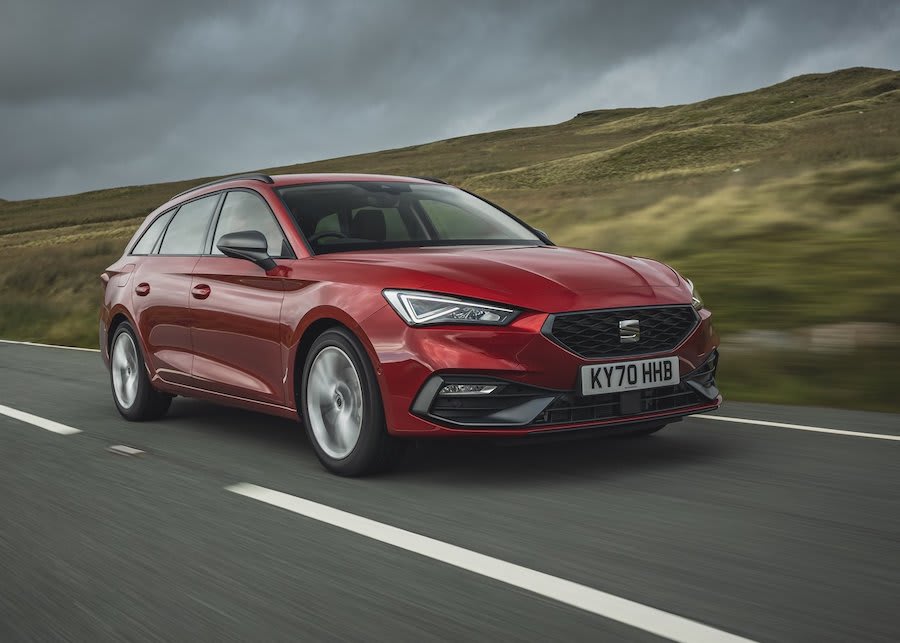
Key Features
The chances are you’ll be interested in a Leon because it’s smart to look at, good to drive, very reasonably priced and has plenty of choice in terms of trims. And if you want to carry as much as possible in the boot, then the Estate is an obvious version to go for. On top of that practicality, the various trim levels are all well-equipped, with most of the modern features you expect in a car available. Even the most basic Leon Estate has alloy wheels, LED headlights and metallic paint, as well as a touchscreen infotainment system. Crucially for family motoring, it also comes loaded with the latest safety kit as standard, including lane-keep assistance and automatic emergency braking.
The Leon Estate is also available in extra-sporty form, although unlike previous models, it’s not officially a Seat any more. Seat has spun off its sporty Cupra models into a separate brand. While we won’t cover the Cupra Leon Estate in this review, it’s worth keeping in mind if you want serious performance.
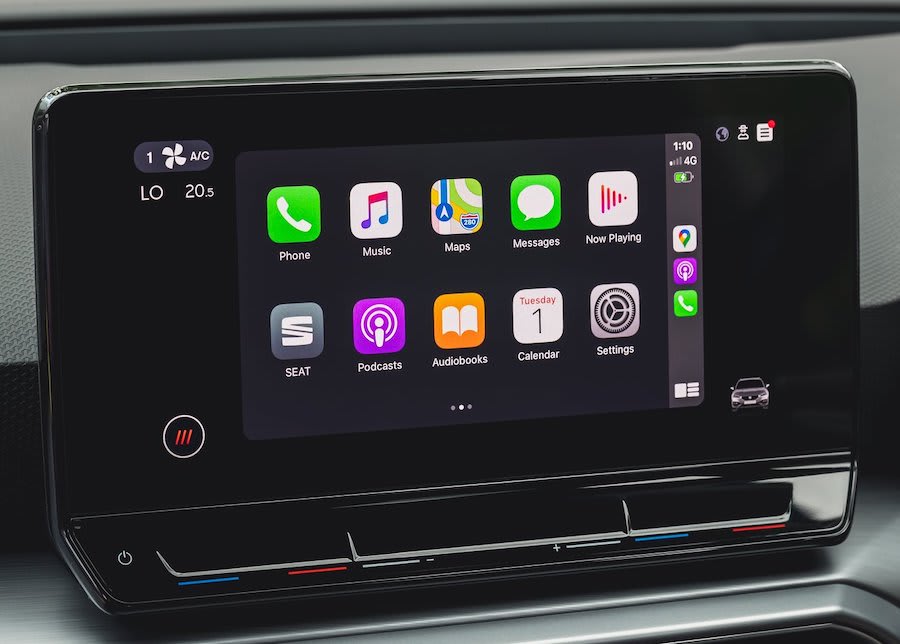
Range & Batteries
The PHEV version of the Leon Estate comes with a 1.4-litre petrol engine and an 85kW electric motor. Its battery means you can get up to 40 miles of electric-only, zero-emission driving, during which time you won’t burn any petrol at all.
Performance & Drive
Seat is a sporty brand, so all of its cars – even non-performance models – have a certain zing to the way they drive. They feel engaging behind the wheel, and the Leon Estate is no exception. Compared to the Golf and the Skoda Octavia, which both share the same underpinnings, the Leon is more fun, more agile. The pay off for this nimble nature is a slightly firmer ride than those two rivals, but never to the point where it’s uncomfortable, even in the stiffer-sprung FR models.
There’s a choice of engines to pick from. The petrol range will better suit those that do shorter journeys, and it starts with the 1.0 TSI, which has 110 horsepower. If you want to use your Leon Estate as a general run-around, this will probably be enough, with a punchy delivery, although if you try and haul a fully-loaded car up a hill, it’ll start to run out of puff. You can choose a manual gearbox or a slick, smooth automatic, and the latter has a mild-hybrid system to help improve fuel economy and reduce emissions.
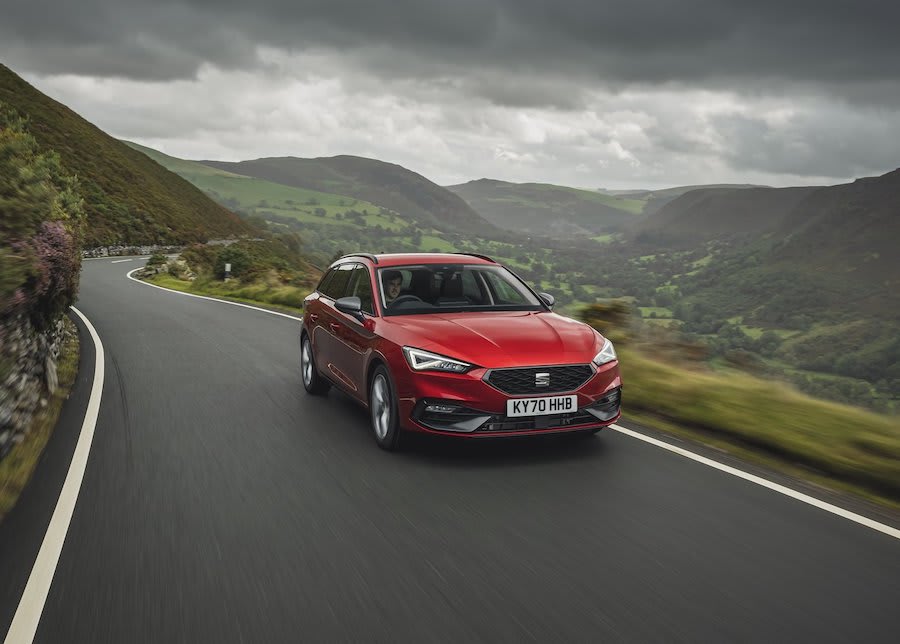
For a bit more punch, look at the 1.5 TSI models, which come with either 130hp or 150hp. These give a bit more shove without impacting too heavily on fuel economy, and again, the auto models have a mild-hybrid system to help even further. It’s a really strong unit that’s both quiet and powerful. There’s also a 190hp 2.0-litre TSI petrol, which has more punch still, although it’s an indulgence; if you’re not particularly after straight-line speed, then the less powerful engines will be fine.
Funnily enough, the most powerful model is also the most fuel efficient… if you use it correctly. The plug-in hybrid Leon Estate combines a 1.4-litre engine with an electric motor, developing a combined 204 horsepower. That gives it a brisk sprint from 0-62mph of 7.5 seconds, but it’ll do up to 40 miles on battery power alone, without even touching the petrol tank. If you do mostly short journeys then it could save you a fortune on fuel, as long as you have somewhere to plug it in and charge it. If you do mostly longer journeys, however, the battery power will run out, and the petrol engine will have to haul heavy electrical equipment.
If that’s the case, then the diesel might suit you better. It’s a 2.0-litre unit with 115hp – not the sprightliest engine in the world, but efficient.
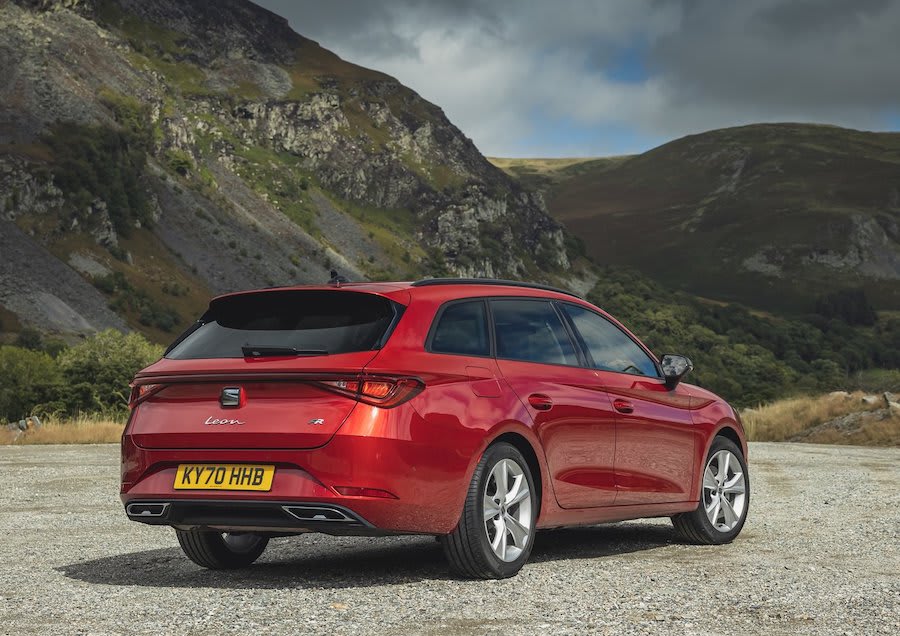
Charging
You can recharge the Leon Estate PHEV’s battery by plugging it into a home wallbox or a public fast charger, although it won’t charge any faster at the latter (unlike pure electric cars, the Leon doesn’t accept faster charging speeds). A wallbox charger will refill the battery from empty in less than four hours, while it’ll take around five hours using a conventional three-pin plug.
Running costs & Emissions
Considering the amount of car you get, leasing costs for the Leon Estate are extremely attractive; at the time of writing, you can have one on your driveway for less than £200 a month, which is less than a Golf.
You can squeeze into a Skoda Octavia for slightly less, but there’s a smaller choice of models; impressively, that monthly cost for the Leon doesn’t skyrocket as you go up the engine and trim range either, with plenty of models costing less than £250 a month. The PHEV model is a bit pricier, but if you can do the maths on potential fuel or tax savings, then it could be worth it. The Leon PHEV is also more affordable than the Octavia PHEV.
Speaking of PHEVs, the plug-in Leon Estate is the model to go for for the best fuel economy, as long as you use it as described above. The official MPG rating is up to 256.8, but that’s largely meaningless in the real world. Stay on battery power and it’ll be even better, lean too much on the petrol engine and it’ll be worse. The PHEV is also the best option for company car drivers, as it attracts a much lower rate of Benefit-in-Kind tax than the other models.
The diesel model is the next most efficient, at up to 65.7mpg, while the petrol cars will get up to 51.4mpg, depending on the exact model.
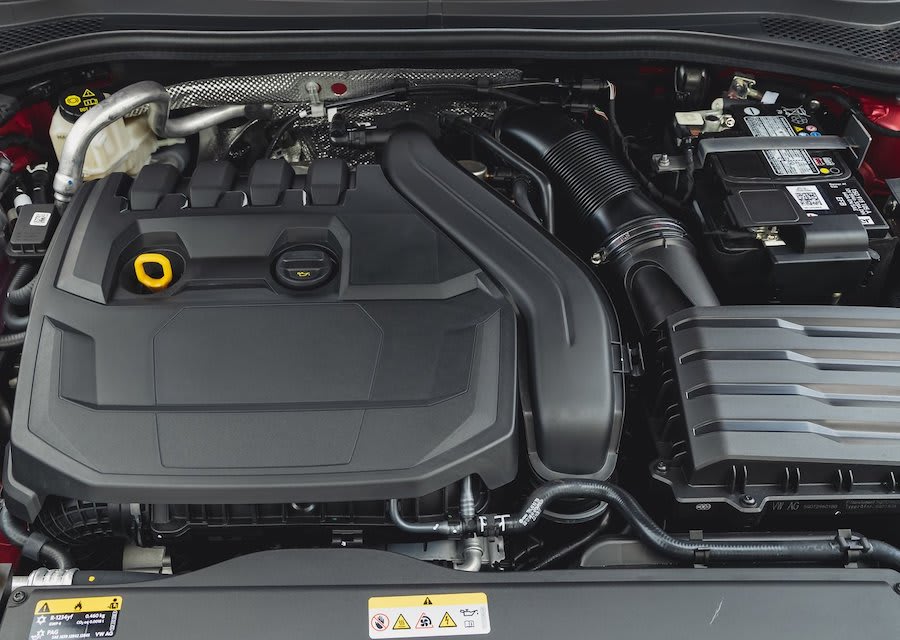
Interior & Technology
Seat leans heavily on Volkswagen for its interiors, but that’s no bad thing; it means top quality plastics and the latest tech, even if the overall effect isn’t quite as classy as Volkswagen manages in the Golf. It’s close behind though, with some angular design touches to make it visually pop.
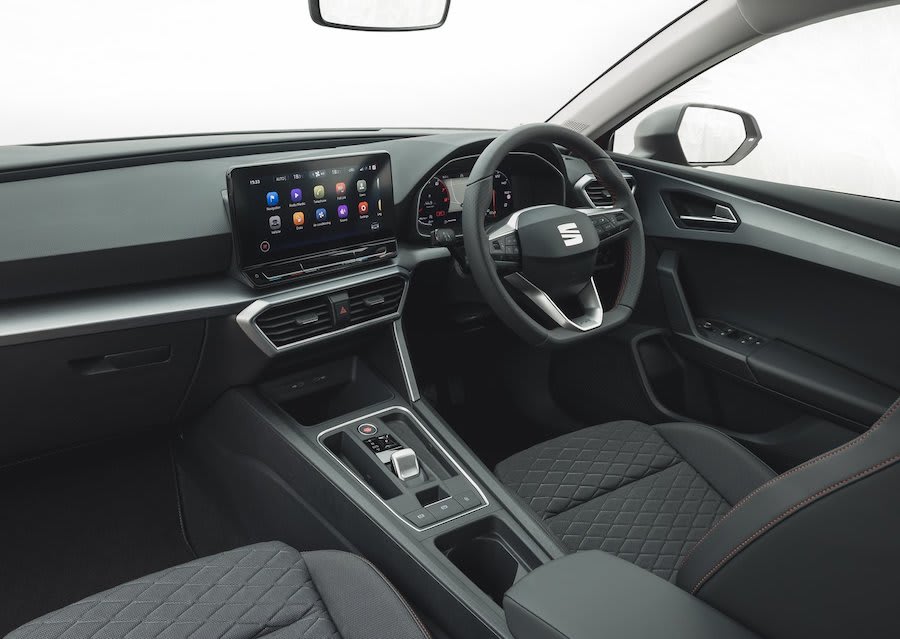
There’s a minimalism to the design too, with a touchscreen infotainment system, and a touch-sensitive bar below it, used for just about every function. This looks great, but it can be a bit of a pain to use. Buttons and dials are much easier to use, especially on the move, so if you want to adjust driving modes, air conditioning or sound settings, it’s just more of a faff than on some rivals. Still, all models get a nice big screen that’s quick to respond and looks snazzy, and Apple CarPlay and Android Auto are included across the range, which makes setting up your smartphone in the car a cinch.
Every model apart from the entry-level SE also gets a Digital Cockpit, which is a screen behind the steering wheel, replacing traditional analogue dials. This looks great and is configurable, so you can have your preferred driving information in front of you.
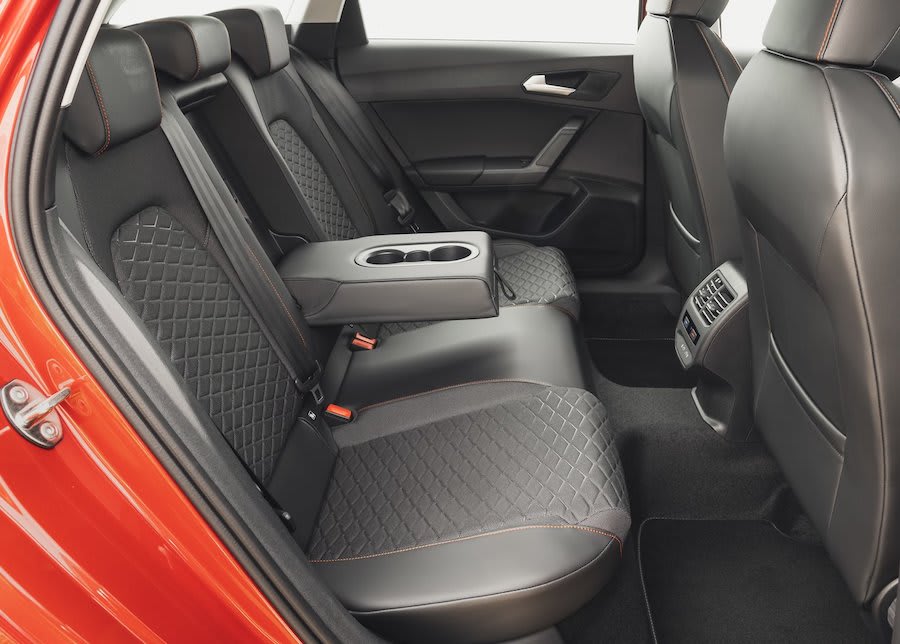
Practicality & Boot Space
You’re likely leasing the Estate version of the Leon because you want space, and there’s plenty of it to be had. The boot has a capacity of 620 litres, which dwarfs rivals like the Ford Focus Estate, although the Octavia Estate is bigger still. If absolute size is a priority, you should also check out the larger Skoda Superb Estate, which in theory belongs to the class above the Leon, but is very keenly priced, so could be a viable leasing alternative.
Passenger space in the Leon is also plentiful both front and back, and there’s a good amount of storage space too, including a box under the centre armrest, good sized door pockets and a sizable glove box. The Octavia still just edges it for practicality, but there’s not loads in it, and the Octavia’s not as nippy to drive.
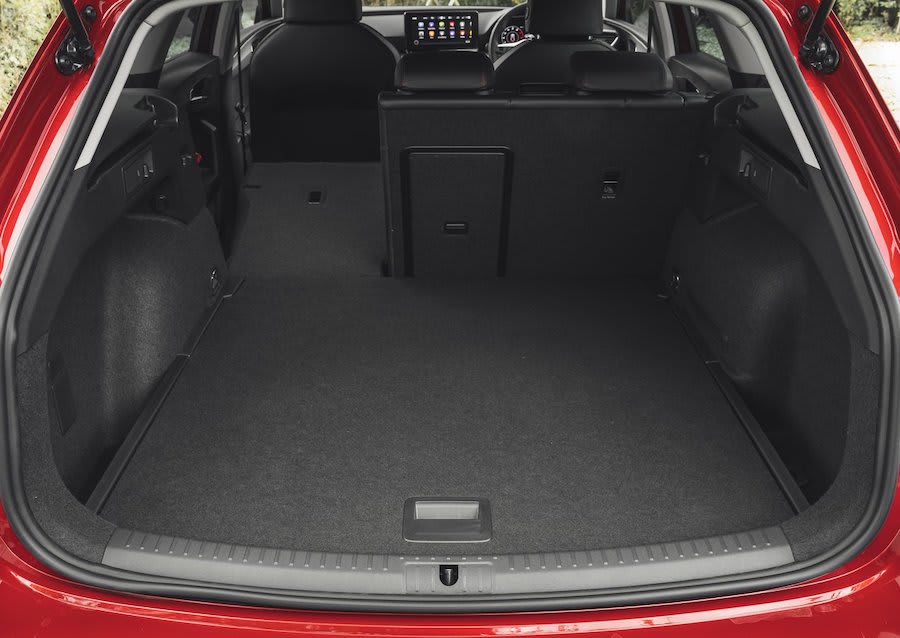
Safety
The Leon was tested by safety organisation Euro NCAP in 2020, and scored the maximum five stars, with particularly good scores for adult and child occupants. All models come with plenty of modern safety features, including automatic emergency braking, which will intervene if you don’t react to an impending collision. Lane assist technology is standard too, and all cars get front, side and curtain airbags, as well as Isofix child-seat mounting points on the outer rear seats.
Optional safety kit includes a road sign display system that reads passing signs and shows them on the dashboard in case you missed them. as well as a blind spot warning system.
Options
There’s a broad spread of choice on the Leon, with six trim levels to choose from.
The range starts with the SE, although it still has plenty of features included as standard. These include 16-inch alloy wheels, and LED headlights, as well as an 8.0-inch touchscreen infotainment system and metallic paint.
Upgrade to the SE Dynamic and you’ll get 17-inch alloys and tinted rear windows, as well as the Digital Cockpit and a larger 10-inch touchscreen and three-zone climate control air conditioning.
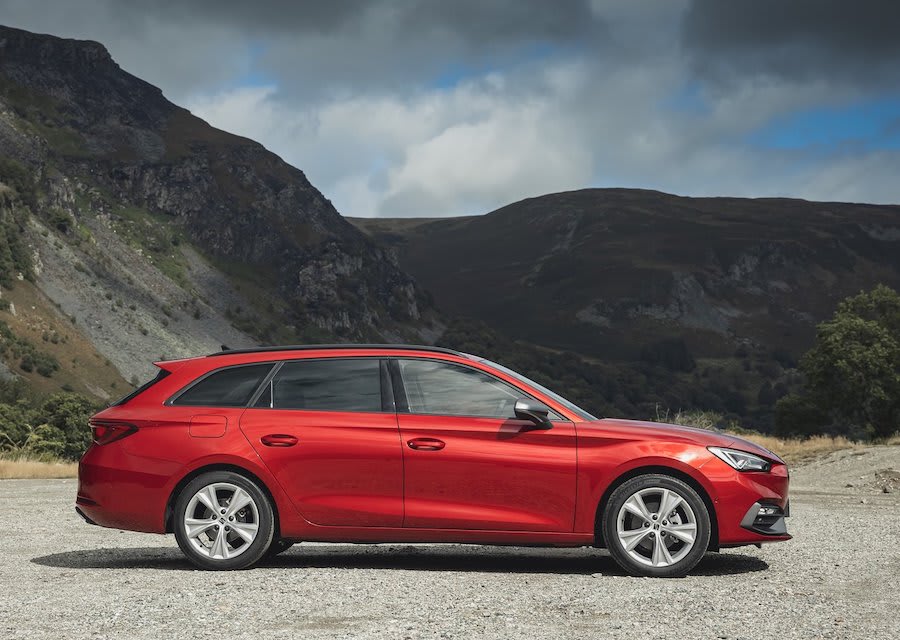
The FR model has a sportier edge, with a more aggressive-looking bodykit on the outside and firmer sports suspension. The FR Sport, meanwhile, adds 18-inch alloy wheels, electric heated mirrors and synthetic suede upholstery, as well as keyless engine start.
The Xcellence models sit at the top of the range. Xcellence comes with 17-inch alloys, chrome roof rails and a rear-view camera and keyless entry. Xcellence Lux adds 18-inch wheels, leather upholstery and adaptive cruise control.
Options are relatively few, but include a space saver spare wheel instead of a tyre repair kit, and a panoramic sunroof. You can also pick from three safety packs, which include various extra features like blind-spot warning, as well as a heated steering wheel.
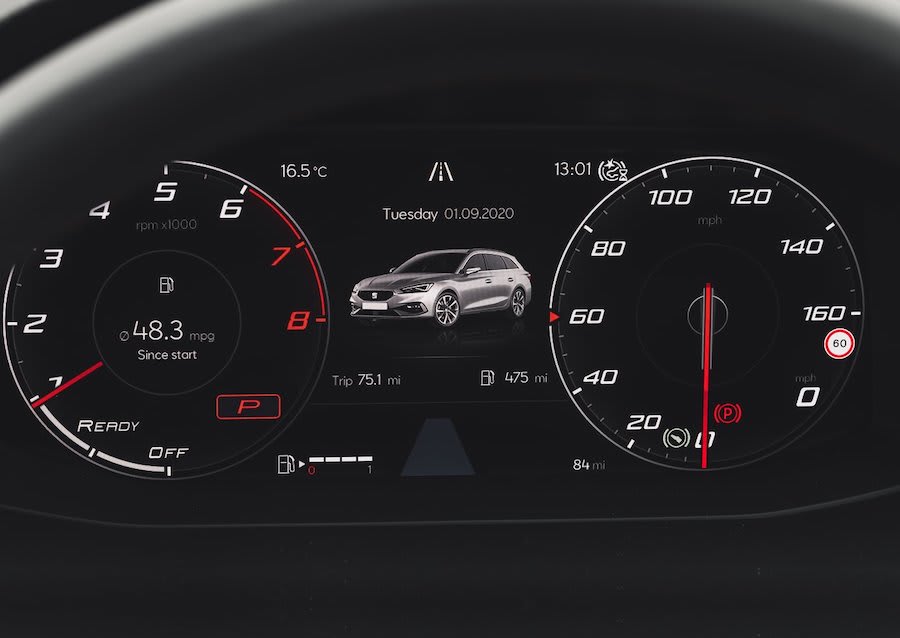
Rival Cars
When it comes to major manufacturers with family estate cars, there are still plenty to choose from, despite the popularity of SUVs. The big players are the Ford Focus Estate and Vauxhall Astra Sports Tourer, both of which are very decent, but lack the classiness of the Seat and don’t offer PHEV models. Then there’s the Seat’s stablemates, the Volkswagen Golf Estate and the Skoda Octavia Estate. The Skoda has the edge on practicality and, sometimes, price, and also offers a PHEV model, but isn’t as fun to drive as the Seat. The Golf, meanwhile, is that little bit more premium and well-rounded, but is more expensive to lease.
You could also consider the Kia Ceed Sportswagon, which again offers a lot of car for the money, or the styling Proceed, which has more of a rakish silhouette while still offering plenty of boot space.
For something more premium and posh, look at the BMW 3 Series Touring, Mercedes-Benz C-Class Estate and Audi A4 Avant, all of which up the quality considerably, but up the price to match.
Verdict & Next Steps
The Seat Leon Estate is a cracking family car that ticks an awful lot of boxes, and with considerable aplomb. It’s affordable, spacious and comfortable, while still being fun to drive. The option of a PHEV could keep your fuel bills super low, and if you really want thrills behind the wheel, there’s always the Cupra-branded model. In fact, about the only fly in the ointment is the slightly fiddly infotainment system, which is a mere irritant rather than any kind of deal-breaker. In just about every other way, the Leon represents a very savvy lease deal indeed.
Where to next?
View latest Seat Leon Estate leasing deals - from just £258.65 per month inc VAT**
Looking for a great leasing deal? Check out our incredible range of car lease deals
New Estate? Read our latest Car Reviews and find the right model for you
Want to know more about leasing? Take a look at our comprehensive Leasing Guides
Interested in everything motoring? Why not catch up on all the latest Car Leasing News.
**Score based on Select’s unique meta score analysis, taking into account the UK’s top five leading independent car website reviews of the Seat Leon Estate
**Correct as of 21/04/2022. Based on 9 months initial payment, 5,000 miles over a 48 month lease. Initial payment equivalent to 9 monthly payments or £2,327.85 Ts and Cs apply. Credit is subject to status.

.jpg)
.jpg)















